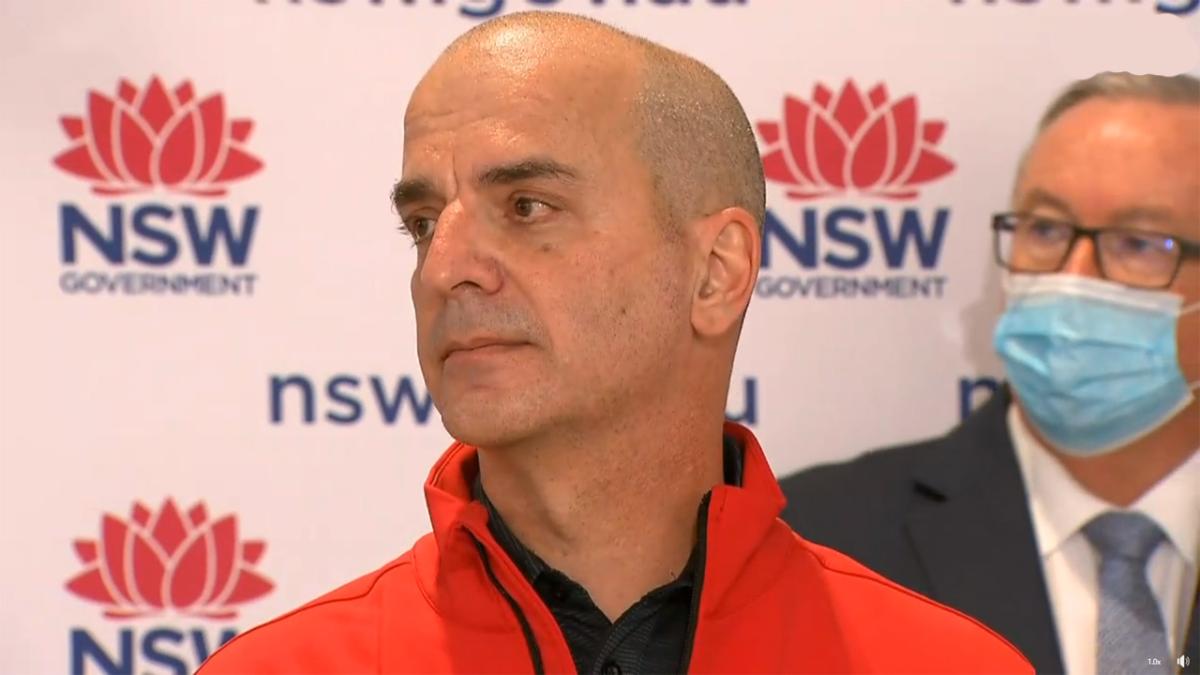
Monday’s coronavirus press conference in NSW featured a special guest who described the current situation in NSW intensive care units (ICUs) in vivid detail, explaining how if we all get vaccinated, it will stop our hospitals from becoming overburdened. This comes after the state recorded 283 new local cases overnight.
Premier Gladys Berejiklian and the usual gang were joined by the Co-Director of the Intensive Care Service at Royal Prince Alfred Hospital in Sydney, Dr Richard Totaro, who gave one of the best explanations about how hospitals are dealing with the pandemic in a very long time.
“ICUs across the state are a relatively limited resource. They are usually quite full, and the ICUs are really the centre of hospitals,” he explained.
“[An ICU] allows us to do things like heart surgery, complex obstetrics, it allows us to look after patients who have had multiple trauma, it allows us to do leukaemia treatments – a whole variety of reasons need access to the intensive care unit.
“This disease is a disease where a small number of people who get sick and end up in the intensive care unit, and they stay in the ICU quite a long time.
“Normally patients in the ICU are there for three or four days on average. Patients who have COVID – who end up on ventilators on the breathing machine, on life support – stay in ICU, from the UK data, something like three weeks. If you are in the ICU, you are on life support and you are on dialysis, you stay in the ICU somewhere around five weeks.
“So you can see when a unit which is designed to have patients coming through at high numbers, with lots of throughput, all of a sudden these patients come in, they slow everything down and it makes the unit slowly fill up.”
NSW recorded 283 new locally acquired cases of COVID-19 in the 24 hours to 8pm last night.
One hundred and six cases were in isolation throughout their infectious period and 42 were in isolation for part of their infectious period. pic.twitter.com/fvZUnwpJ4F
— NSW Health (@NSWHealth) August 9, 2021
The main way we can all ease the burden on ICUs – for both our own sake and for society’s sake – is to get vaccinated.
So far, nobody in Australia who has ended up in intensive care with COVID-19 has been fully vaccinated.
“We want to stop people getting sick and ending up in ICU, and there is really good evidence from all over the world that the vaccinations that we have available to us to stop people needing to come into hospital,” Totaro said.
“Almost all the hospitalisation goes away, almost all the need for ICU goes away and almost all the death goes away once people have been vaccinated properly. And that is what we want to see.”
He added that vaccines make COVID-19 “a much more mild disease” where people can be treated as outpatients or via telehealth instead of being stuck in intensive care.
“We know from having looked around the world that when hospitals are overburdened, when they are running at overcapacity, more people die than would otherwise,” he said.
Totaro also made the really important point of acknowledging ICU nurses (and nurses in general) who have been doing this unbelievably tough slog day in, day out, in order to literally save lives during a global pandemic.
Easing the burden on hospitals directly translates to helping the nurses do what they do best, for the people who need it most.
“Our nurses are absolutely vital to providing the technical skills of looking after the machines, are vital to looking after the patients and recognising when they’re getting sick, when they’re getting better, and also to providing compassionate care to the patients when they are having the worst time of their lives, and to the patients’ families,” he said.
“COVID has really changed how we have to deal with families. You can’t do face-to-face meetings, we have to do this digital, it adds a layer of complexity.
“Looking after COVID patients is hard work and really demanding. You are in layers of PPE which is hot, particularly for the nurses. It is difficult work, it is physical work.”
As always, the expert advice here is to get vaxxed if you haven’t already.
“If people get themselves vaccinated, they are helping themselves because you will stop yourself getting sick, you are going to stop the people around you, your family, your loved ones, the people that you live with and work with from getting sick,” Totaro said.
“Then we can go back to our lives that we had before. So getting everybody vaccinated – older people, young people, absolutely have to go out and get vaccinated, that is a really important thing.”
All adult Aussies (yep, even if those of us under 40) are currently able to get the safe and effective AstraZeneca vaccine through a GP. Talk to a doctor to see if it’s right for you.
Alternatively, you can triple-check to see if you’re eligible for the Pfizer vaccine here.
The best vaccine is the first one you can get, and that’ll be our ticket out of this mess.



